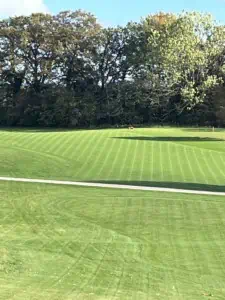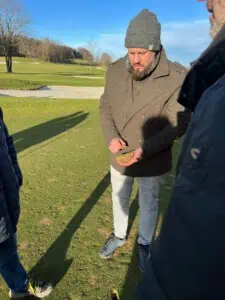Bergkramerhof: pilot project with mowing robots and without pesticides
“At the moment, we’re at the limit every day. Deadlines and work without end.” That sounds serious, but the man saying it seems to be in high spirits: Olaf Gühringwho flew around the world as a pilot throughout his life, and his wife Dorotheewho was a flight attendant and coordinator in the same business, have owned the Bergkramerhof golf course in Wolfratshausen near Munich. “On New Year’s Eve 2022, we suddenly owned the golf course,” is how the two describe their journey from hobby golfers to golf course operators, which was quick, spontaneous and surprising. This happens from time to time with changes of ownership in the golf scene. However, the story is worth telling above all because it will also provide an interesting best practice case on the subject of greenkeeping.
“We have been given a flower meadow”
The Bergkramerhof golf course has long been operated completely without the use of pesticides. However, the condition at the handover was so miserable “that it couldn’t really get any worse”, as Dorothee Güring describes it. “We bought a golf course and got a flower meadow,” recalls her husband. What was actually a very good golf course in an outstanding location with a view of the mountains had become a run-down project with just over 100 members, dilapidated buildings and a miserable reputation. The good thing about it: it could only get better.
The Gühring couple want to do many things, preferably everything better. This also includes a commitment to environmental protection and sustainability. Four and a half golf courses are located in water protection zones 2 and 3, so the use of chemicals is not an issue. “We don’t need chemistry for a leisure activity,” says Dorothee Gühring. Which is why head greenkeeper Thorsten Cramer, who works for the Sommerfeld company as team leader, used a lot of mechanical methods, sand and reseeding to get to grips with the abundant weeds on the fairways. At the start of the 2024 season, a critical look at the fairways proves that it worked. The fairways look good. The 18-hole course is managed by six greenkeepers. For additional work such as renovation work or pruning extra personnel are brought in.
“We have the confidence to do that”
The Bergkramerhof is a pilot project for the Sommerfeld company. Owner Frank Sommerfeld wants to test out what the greenkeeping of the future will look like here. “That was the customer’s explicit wish. In a three-day workshop, we first went through the pros and cons as well as the risks. In the end, we said: we dare to do this.”
In view of the fact that the EU has long been discussing a complete ban on pesticides, the company needs experience anyway. Four probes are now installed under the ninth green of the course in the greater Munich area, which transmit all soil values to the control center in real time. In each case, half of the green is provided with modified care products. In the end, it is hoped that guidelines can also be applied to other systems.
After the first year, Sommerfeld can draw initial conclusions: “We are currently slightly below the quality that we would have achieved with conventional care, but that is certainly also due to the fact that we still need to gain experience.” Overall, Sommerfeld is satisfied, but also says: “The costs are around 15 percent higher than in conventional operation.” Experienced, well-trained greenkeepers are part of the success.
The same applies to the robot mowers that are currently mowing the entire site. Gühring is certain that electrification is the model of the future. It allows photovoltaics to be installed on all house roofs. Green electricity should also reduce the golf course’s energy costs this season. All greenkeeping machines and vehicles here have electric motors. Gühring is satisfied with the mowing pattern of the robot mowers, but he and Sommerfeld are still hoping for technical improvements in other technical areas. However, a return to fossil fuels is no longer an option for Gühring.
In a few weeks, this will also be visible in the parking lots. Twelve e-charging stations are installed. Half of it for golfers, half for normal drivers, who can then perhaps enjoy the view of the mountains from the clubhouse’s new terrace while their vehicle is charging.
Participation in the “Golf and Nature” program, which is financially supported by the Bavarian Golf Association, was only logical in view of the company’s overall orientation. However, it is important to the couple that “this is a golf course for everyone.” The topic of nature conservation is part of the standard program, but it should not impose itself.
This has obviously been well received. On January 1, 2023, the membership list was at zero, but has since passed the mark of 700. “Nevertheless, this is of course still a major subsidy business,” the new owners summarize. “But we are very satisfied, the future looks good.” Munich’s golf customers really like the couple’s drive. “It just draws you in that something happens here every day,” says Olaf Gühring. There are golfers who have become members precisely because of the pesticide-free greenkeeping. For most others, it is more of a pleasant side effect.
Gühring explains with a smile that they definitely didn’t see themselves as pioneers in environmental protection in their previous professional life. “Anyone who works as a pilot knows what they are blowing up.” But the takeover of the golf course has changed her understanding quite a bit. Now the business is different – one that only works with intact nature. “That’s how we do it now,” says Gühring. And even with this sentence, he still seems in high spirits.










 Foto: Royal Golf La Bagnaia
Foto: Royal Golf La Bagnaia